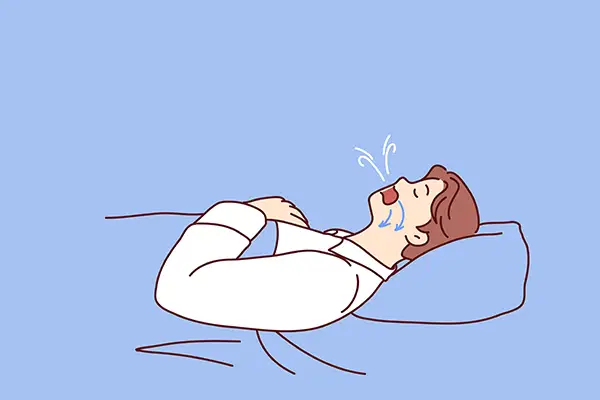How Your Teeth Are Left in Danger When You Snore
Posted on 3/15/2025 by Singing River Dentistry - Athens |
 While snoring might seem like nothing more than an annoyance to you and your partner, it could actually be a sign of a serious health condition known as sleep apnea. This condition causes your breathing to repeatedly stop and start while you sleep, which can have a number of negative consequences for your oral health. While snoring might seem like nothing more than an annoyance to you and your partner, it could actually be a sign of a serious health condition known as sleep apnea. This condition causes your breathing to repeatedly stop and start while you sleep, which can have a number of negative consequences for your oral health.
The Link Between Sleep Apnea and Oral Health
When you have sleep apnea, the constant disruption of your sleep cycle can lead to dry mouth. This is because you're not breathing through your nose as often, which allows more air to escape through your mouth, drying it out. Dry mouth can then increase your risk of developing cavities and gum disease, as it reduces the amount of saliva available to wash away food particles and bacteria.
In addition, the vibrations caused by snoring can damage the soft tissues in your mouth, making them more susceptible to infection. Over time, this can lead to gum recession and even tooth loss.
Furthermore, research has shown a link between sleep apnea and bruxism, also known as teeth grinding. This is because the lack of oxygen during sleep can cause your muscles to tense, including the muscles in your jaw. The constant clenching and grinding of your teeth can wear down your enamel, making them more prone to chips and cracks.
What You Can Do
If you suspect you might have sleep apnea, it's important to see a doctor right away. They will be able to diagnose the condition and recommend appropriate treatment. This may include using a CPAP machine, which helps to keep your airway open while you sleep, or oral appliance therapy, which involves wearing a custom-fitted mouthpiece that prevents your jaw from clenching.
In addition to seeking treatment for sleep apnea, there are several things you can do to protect your oral health:
| • |
Maintain good oral hygiene: Brush your teeth twice a day and floss daily. This will help to remove plaque and bacteria, reducing your risk of developing cavities and gum disease. |
| • |
Use a mouthwash: Choose a mouthwash that contains fluoride to help strengthen your enamel. |
| • |
Drink plenty of water: This will help to keep your mouth moist and reduce your risk of dry mouth. |
| • |
See your dentist regularly: Regular dental checkups are important for everyone, but they are especially important if you have sleep apnea. Your dentist can monitor your oral health and provide you with the necessary care to keep your teeth and gums healthy. |
Restorative Dentistry: An Option for Advanced Damage
In some cases, sleep apnea may have already caused damage to your teeth and gums. If this is the case, restorative dentistry can help to restore your oral health. Restorative dentistry encompasses a wide range of procedures, such as fillings, crowns, bridges, and dental implants, that can be used to repair or replace damaged teeth.
By taking steps to address both your sleep apnea and your oral health, you can protect your smile and keep your mouth healthy for years to come.
Don't wait to seek help if you suspect you might have sleep apnea. Talk to your doctor today and take steps to protect your oral health.
|
|
